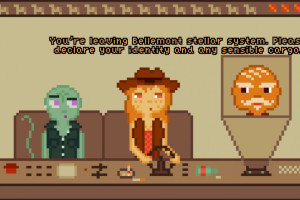 ‘Til Cows Tear Us Apart mostly works on the strength of its dialogue and soundtrack. The interactivity level is small, but there are multiple endings and it does ask for at least a bit of thought from the player. Not a long game, but it manages to pack in a lot.
‘Til Cows Tear Us Apart mostly works on the strength of its dialogue and soundtrack. The interactivity level is small, but there are multiple endings and it does ask for at least a bit of thought from the player. Not a long game, but it manages to pack in a lot.
Rick and Morty is great
There’s a TV show on the Cartoon Network called Rick and Morty, now in its second season. If you haven’t seen it, get on it. It’s hilarious and bawdy and sometimes disconcertingly dark.
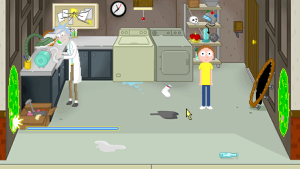 Once you’ve seen the show, or if you’ve seen it already, you’ll probably be saying to yourself: “Gee. I would like to experience more of Rick and Morty, in any way possible.” Well, good thing for you they rushed out a licensed adventure game giving you just that opportunity. It includes Rick, being just as cantankerous and insulting as you’d like, Morty, being… probably not as dumb as Rick thinks he is, and some other junk, being there just to give Rick and Morty something to do. Unsurprisingly, it’s called “Rick and Morty’s Rushed Licensed Adventure” and while that may be accurate the game is better than that title might suggest – entirely on the strength of its dialogue and appreciation of the characters with which you’re already familiar. Also it’s free, so what’s to complain about really?
Once you’ve seen the show, or if you’ve seen it already, you’ll probably be saying to yourself: “Gee. I would like to experience more of Rick and Morty, in any way possible.” Well, good thing for you they rushed out a licensed adventure game giving you just that opportunity. It includes Rick, being just as cantankerous and insulting as you’d like, Morty, being… probably not as dumb as Rick thinks he is, and some other junk, being there just to give Rick and Morty something to do. Unsurprisingly, it’s called “Rick and Morty’s Rushed Licensed Adventure” and while that may be accurate the game is better than that title might suggest – entirely on the strength of its dialogue and appreciation of the characters with which you’re already familiar. Also it’s free, so what’s to complain about really?
One Step Back
I don’t like to be too negative, but Braid pissed me off. It was a decent enough puzzle platformer, using some time-based mechanics which were new then, but in addition to that it was a media darling. Every gaming site was going on and on about this thing, and a lot of their attention was spent on the… “plot.” And there’s reason for that, the game really pushed it – hinting at something profound, keeping you going to the end with the expectation of some insightful revelation. And when you reached the end what you got was really just more hints. It never came together and actually said anything, it just made the suggestion over and over again that there was something meaningful there beneath the surface. After you finished the game you’d spend a little while thinking to yourself that you weren’t getting it, that you just need to to find that thread – the thing which brings together a bunch of jumbled ideas and phrases into something insightful or at least cohesive… There’s no thread. Fucking Braid.
There are plenty of bad games and there are plenty of pretentious games (which are bad), but they usually don’t get the kind of attention that Braid got. That was the big thing, it felt like betrayal in a way. The game made you feel dumb for not understanding an idea that wasn’t there, but you were sure there must have been something there… the critics wouldn’t be fawning all over this if it was just about dicking you around… right?
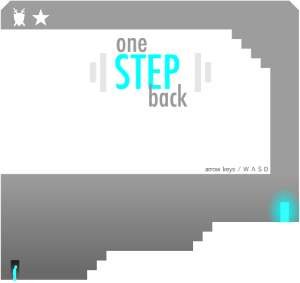 Well they did and it made lots of money, so now that’s a thing: puzzle platformers with levels tied together by deep thoughts. Fortunately for us, most other developers haven’t latched on to the idea that deep thoughts become even deeper when they don’t make any sense. As a result, despite my snark, some of these are actually pretty decent. I don’t know if Braid was the direct inspiration for One Step Back, there are plenty of similar games, but I am confident that somewhere down the line Braid was influential.
Well they did and it made lots of money, so now that’s a thing: puzzle platformers with levels tied together by deep thoughts. Fortunately for us, most other developers haven’t latched on to the idea that deep thoughts become even deeper when they don’t make any sense. As a result, despite my snark, some of these are actually pretty decent. I don’t know if Braid was the direct inspiration for One Step Back, there are plenty of similar games, but I am confident that somewhere down the line Braid was influential.
All right, this is too much talking for such a short game. One Step Back is a decent little platformer that’s a little too moody for its own good, but the time-clone mechanic is fun and doesn’t overstay its welcome. The message isn’t a bad one, at least it makes sense, it’s just a little out of place.
Moon Waltz is a short one-button adventure about a man’s love for the moon
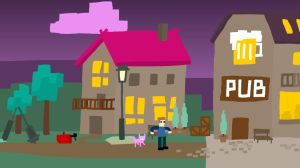 Moon Waltz is a very short game, but it’s one you’re going to want to play multiple times. A lot can happen as the man takes his walk and you’ll likely want to experiment a bit.
Moon Waltz is a very short game, but it’s one you’re going to want to play multiple times. A lot can happen as the man takes his walk and you’ll likely want to experiment a bit.
Hanna in a Choppa does the venerable cave flier genre proud
There’s a genre of games called “cave fliers” which don’t get a lot of love anymore. You see one now and then, and smartphones have gotten them a little attention again, but they’re not exactly well-represented. In a way this isn’t surprising, cave fliers are characterized by taking something simple, movement, and making it difficult. People can get frustrated when all they’re trying to do is get from here to there and they can’t even manage that much.
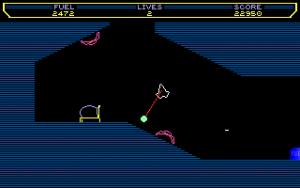 Cave fliers are games consisting of moving against gravity, almost always through enclosed spaces and usually by means of a single propulsion mechanism which has to be aimed in order to direct your motion. The most common way this is implemented is something along the lines of Asteroids – you can fire your rocket to move forward, wherever you’re pointed, and you can also rotate, and that’s it. Those are your movement controls. The difficulty is mostly about the strength of gravity and your rocket, and how forgiving the ground is when you run into it. There are often enemies and some element of combat, but that’s not usually the focus. Frequently, just to make to make things harder, there’s also cargo involved – something heavy to be awkwardly transported.
Cave fliers are games consisting of moving against gravity, almost always through enclosed spaces and usually by means of a single propulsion mechanism which has to be aimed in order to direct your motion. The most common way this is implemented is something along the lines of Asteroids – you can fire your rocket to move forward, wherever you’re pointed, and you can also rotate, and that’s it. Those are your movement controls. The difficulty is mostly about the strength of gravity and your rocket, and how forgiving the ground is when you run into it. There are often enemies and some element of combat, but that’s not usually the focus. Frequently, just to make to make things harder, there’s also cargo involved – something heavy to be awkwardly transported.
It’s a quirky genre but there are a bunch of recognizable examples, it’s just that almost all of them are 15+ years old: Thrust, Solar Jetman, Sub-Terrania… Lander was a 3D cave flier released in 1999 where you controlled two rotational axis with your mouse instead of just one. That was a good one. Flappy Bird could also be described as a greatly simplified cave flier, though it isn’t the most flattering example.
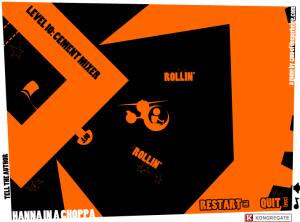 Hanna in a Choppa is a flash game from 2008 which takes the old model and does away with a lot of the difficulty, while adding some humor and a whole lot of orange. In some respects it could be described as a little dumbed-down, most of what makes it easier is a control scheme that operates in world space: from the perspective of the player rather than from the perspective of the player-character. So up always means up, no matter which direction the PC is facing. This doesn’t make physical sense, but it does make for a light and enjoyable game. The developer agonized a bit over this decision, and wrote an article describing the design process here.
Hanna in a Choppa is a flash game from 2008 which takes the old model and does away with a lot of the difficulty, while adding some humor and a whole lot of orange. In some respects it could be described as a little dumbed-down, most of what makes it easier is a control scheme that operates in world space: from the perspective of the player rather than from the perspective of the player-character. So up always means up, no matter which direction the PC is facing. This doesn’t make physical sense, but it does make for a light and enjoyable game. The developer agonized a bit over this decision, and wrote an article describing the design process here.
Good news! The classic cave flier control scheme is still available in the options, though it uses a mouse for rotation rather than the more typical keys. That… seems like a mistake for a flash title which takes place in a small box within a browser, but at least it’s there for the hardcore cave flier aficionados. I don’t recommend it.
In 2012 there was a sequel, Hanna in a Choppa 2, which added a bunch of non-choppa vehicles. For some reason this is named “Tunnel Pilot” on addictinggames.com, who sponsored its development.
1Quest finds a way to allow for partial success in a roguelike
1Quest is a short roguelike that seems to have gone unappreciated. It’s one of my favorite examples of this style done well, but player reviews in the places I’ve checked seem to be really harsh. I can’t understand it. The game really delivers the roguelike experience to a greater degree than I expect in something of this scope, with an involved skills and magic system, a good variety of loot, and the facilitation of the kind of environmental survival techniques that I expect in every roguelike but don’t always see – by that I mean the ability, and often necessity, to use traps and water and other environmental features to your advantage.
It’s difficult, but difficulty is a necessary part of the roguelike experience. In fact, 1Quest has a clever innovation in this respect: the princess and eight other children have been captured and your quest is to rescue them. Ideally all of them, but some is better than none. Unlike most rogulikes, failure doesn’t mean death for you but rather death for one of the children. How’s that for motivation? It allows you to keep going, it means you don’t lose everything when you make a mistake, but there’s a pretty strong incentive to try again until you get it right. There are also multiple paths to take on your journey, changing it up a little to keep things interesting, multiple spell schools which are (sort of) mutually exclusive and multiple weapons skills, all to ensure there’s some variety from game to game.
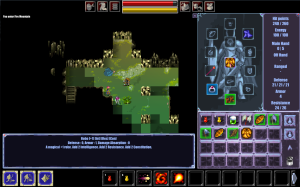 As you’d anticipate from a flash game, it’s short compared to the big names of the genre, Nethack, ADOM, etc., though roguelikes are unusual in that it’s free games which are the big headliner titles. Commercial roguelikes are always smaller in scope. Compared to its peers though, 1Quest really delivers a lot which will be familiar to roguelike veterans – managing to fit just about everything that you’d expect from a roguelike into its small package. (Seriously, a lot of these games don’t even let you move diagonally. It’s annoying.)
As you’d anticipate from a flash game, it’s short compared to the big names of the genre, Nethack, ADOM, etc., though roguelikes are unusual in that it’s free games which are the big headliner titles. Commercial roguelikes are always smaller in scope. Compared to its peers though, 1Quest really delivers a lot which will be familiar to roguelike veterans – managing to fit just about everything that you’d expect from a roguelike into its small package. (Seriously, a lot of these games don’t even let you move diagonally. It’s annoying.)
There’s several versions of this available: a free online version, another commercial version available from several sources (that’s three links), and a commercial Android version. As near as I can tell there aren’t any differences between the free version and the commercial one, though I will point out two things: flash cookies are an awful way to store data, so if you find yourself playing this a lot you might consider paying some money just to ensure that your records and saves don’t disappear. Second, it’s not a lot of money and this person hasn’t gotten either the praise or the livelihood that they deserved from this game.
Finally, I’m going to link to the dev’s blog, just because it seems polite. Maybe you all love the game so much that you want to keep abreast of anything new that the dev might be up to.